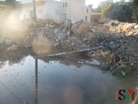21 sept 2015
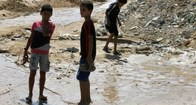
Israel’s leadership of army staff praised the Egyptian coup authorities for flooding the Egypt-Gaza borders with seawater.
The occupation army staff acclaimed the flooding project carried out by the Egyptian authorities as part of intents to destroy cross-border tunnel activity, saying: “Such a service is just priceless.”
In what observers branded an unprecedented move set to please the Israeli occupation, the Egyptian army forces have begun to pump water from the Mediterranean Sea into underground tunnels on the southern borders of the besieged Gaza Strip.
The Water Authority in the blockaded Gaza Strip warned Saturday of the serious repercussions of such a project, saying the high-salinity water is a threat to nearby civilian homes and cultivated land lots.
According to Gaza’s Water Authority, the move poses a serious threat to the Strip’s water and food security.
Blockaded by the Israeli regime since 2007, Gaza used to receive urgently-needed supplies through the network of underground tunnels on its border with Egypt's Sinai Peninsula.
Palestinians in Gaza are living under inhuman conditions due to the tough siege imposed by the Israeli occupation and also due to Egypt’s quasi-permanent closure of the Rafah border-crossing.
The occupation army staff acclaimed the flooding project carried out by the Egyptian authorities as part of intents to destroy cross-border tunnel activity, saying: “Such a service is just priceless.”
In what observers branded an unprecedented move set to please the Israeli occupation, the Egyptian army forces have begun to pump water from the Mediterranean Sea into underground tunnels on the southern borders of the besieged Gaza Strip.
The Water Authority in the blockaded Gaza Strip warned Saturday of the serious repercussions of such a project, saying the high-salinity water is a threat to nearby civilian homes and cultivated land lots.
According to Gaza’s Water Authority, the move poses a serious threat to the Strip’s water and food security.
Blockaded by the Israeli regime since 2007, Gaza used to receive urgently-needed supplies through the network of underground tunnels on its border with Egypt's Sinai Peninsula.
Palestinians in Gaza are living under inhuman conditions due to the tough siege imposed by the Israeli occupation and also due to Egypt’s quasi-permanent closure of the Rafah border-crossing.
20 sept 2015
|
|
The Water Authority in the blockaded Gaza Strip warned Saturday of the serious repercussions of an underway Egyptian project flooding the Egypt-Gaza border with seawater in an attempt to destroy cross-border tunnel activity.
A statement by Gaza’s Water Authority said the high-salinity water is a threat to nearby civilian homes and cultivated land lots. According to Gaza’s Water Authority, the move poses a serious threat to the Strip’s water and food security. In what observers branded an unprecedented move set to please the Israeli occupation, the Egyptian army forces have begun to pump water from the Mediterranean Sea into underground tunnels on the southern borders of the besieged Gaza Strip. |
Blockaded by the Israeli regime since 2007, Gaza used to receive urgently-needed supplies through the network of underground tunnels on its border with Egypt's Sinai Peninsula.
Palestinians in Gaza are living under inhuman conditions due to the tough siege imposed by the Israeli occupation and also due to Egypt’s quasi-permanent closure of the Rafah border-crossing.
Palestinians in Gaza are living under inhuman conditions due to the tough siege imposed by the Israeli occupation and also due to Egypt’s quasi-permanent closure of the Rafah border-crossing.
19 sept 2015
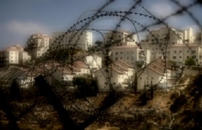
Israeli settlers, Saturday, buried a Palestinian-owned water well in the town of al-Khader, south of Bethlehem, with dirt and rocks to prevent the owner from using it to irrigate his crops.
Coordinator of the anti wall and settlement committee, Ahmad Salah, informed WAFA that a group of settlers filled a water well belonging to local Mohammad al-Baik with dirt and rocks, noting that the well is located in an agricultural land adjacent to the Israeli settlement of Eliezer, built illegally on the land of the town’s land.
The activist said that the well was built there almost 60 years ago and is used for irrigation purposes.
According to B’Tselem, the Israeli information center for human rights, “Israeli civilians have perpetrated various forms of violence against Palestinians in the Occupied Territories, damaging their lands, their persons and their property.”
The center stressed that, “As the occupying force, Israel must protect the Palestinians in the West Bank. However, the Israeli authorities neglect to fulfill this responsibility and do not do enough to prevent Israeli civilians from attacking Palestinians, their property and their lands.”
“The undeclared policy of the Israeli authorities in response to these attacks is lenient and conciliatory. Perpetrators are rarely tried, and many cases are not investigated at all or are closed with no operative conclusions.”
According to OCHA, ““The Israeli authorities repeatedly fail to enforce the rule of law in response to Israeli settlers’ acts of violence against Palestinians. Israeli forces often fail to stop attacks and follow-up afterwards is inadequate or poorly conducted. Measures of the current system, including requiring Palestinians to file complaints at police stations located inside Israeli settlements, actively work against the rule of law by discouraging Palestinians from filing complaints.”
Meanwhile, Al-Haq human rights organization stated that, “The illegal Israeli settlement policy of transferring Israeli civilians into occupied territory is directly responsible for creating a hostile environment that puts civilians, both Israeli and Palestinian, in harm's way.”
Settlements are illegal under international law as they violate Article 49 of the Fourth Geneva Convention, which prohibits the transfer of the occupying power’s civilian population into occupied territory.
Coordinator of the anti wall and settlement committee, Ahmad Salah, informed WAFA that a group of settlers filled a water well belonging to local Mohammad al-Baik with dirt and rocks, noting that the well is located in an agricultural land adjacent to the Israeli settlement of Eliezer, built illegally on the land of the town’s land.
The activist said that the well was built there almost 60 years ago and is used for irrigation purposes.
According to B’Tselem, the Israeli information center for human rights, “Israeli civilians have perpetrated various forms of violence against Palestinians in the Occupied Territories, damaging their lands, their persons and their property.”
The center stressed that, “As the occupying force, Israel must protect the Palestinians in the West Bank. However, the Israeli authorities neglect to fulfill this responsibility and do not do enough to prevent Israeli civilians from attacking Palestinians, their property and their lands.”
“The undeclared policy of the Israeli authorities in response to these attacks is lenient and conciliatory. Perpetrators are rarely tried, and many cases are not investigated at all or are closed with no operative conclusions.”
According to OCHA, ““The Israeli authorities repeatedly fail to enforce the rule of law in response to Israeli settlers’ acts of violence against Palestinians. Israeli forces often fail to stop attacks and follow-up afterwards is inadequate or poorly conducted. Measures of the current system, including requiring Palestinians to file complaints at police stations located inside Israeli settlements, actively work against the rule of law by discouraging Palestinians from filing complaints.”
Meanwhile, Al-Haq human rights organization stated that, “The illegal Israeli settlement policy of transferring Israeli civilians into occupied territory is directly responsible for creating a hostile environment that puts civilians, both Israeli and Palestinian, in harm's way.”
Settlements are illegal under international law as they violate Article 49 of the Fourth Geneva Convention, which prohibits the transfer of the occupying power’s civilian population into occupied territory.
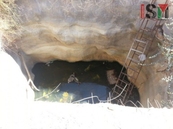
Jabari family well.
The children of the Jabari family in Jabari neighbourhood of al-Khalil are singing along to a Palestinian children’s television show. It is a sunny Saturday morning but in the small living area, six tiny children sit with their mothers who explain to us that they do not go outside because of the settlers. They quietly recite every word of the television songs to themselves.
With the massive illegal Israeli settlement, Kiryat Arba – home to nearly eight thousand Israeli settlers, directly facing their home, Saturday morning’s aren’t the only time the Jabari family is being affected. They have a newly built synagogue behind them, along with an Israeli police station. All are connected by a path that brings settlers along the family property on a regular basis. “The settlers jump behind our home in the night. They bang on the children’s windows and terrorize them.”
International human rights observers from the ISM and others have been providing protective presence for the family who, with so many children living in the home, haven’t had running water since the second Intifada. Their well, fronting the home, contains more trash than water and once they are able to procure the resources to repair it, it is subject to the same assault the family themselves endure month in and month out.
“During the Jewish holiday, the settlers filled the streets praying loudly. They shouted curse words at us.” Settlers had built a synagogue tent structure in recent months which was ordered demolished by the Israeli court system. Yet even with this small justice being done, a greater injustice persists. The land, belonging to Palestinians, has now been declared by Israeli forces to be a ‘closed military zone,’ which makes it off limits to all but Israeli military personnel.
However, settlers routinely frequent the area to pray under the protection of the Israeli army, while Palestinians are barred completely from entering. For the Jabari family, protective presence carries on as does the settler violence, harassment and constant intrusion into their lives.
The children of the Jabari family in Jabari neighbourhood of al-Khalil are singing along to a Palestinian children’s television show. It is a sunny Saturday morning but in the small living area, six tiny children sit with their mothers who explain to us that they do not go outside because of the settlers. They quietly recite every word of the television songs to themselves.
With the massive illegal Israeli settlement, Kiryat Arba – home to nearly eight thousand Israeli settlers, directly facing their home, Saturday morning’s aren’t the only time the Jabari family is being affected. They have a newly built synagogue behind them, along with an Israeli police station. All are connected by a path that brings settlers along the family property on a regular basis. “The settlers jump behind our home in the night. They bang on the children’s windows and terrorize them.”
International human rights observers from the ISM and others have been providing protective presence for the family who, with so many children living in the home, haven’t had running water since the second Intifada. Their well, fronting the home, contains more trash than water and once they are able to procure the resources to repair it, it is subject to the same assault the family themselves endure month in and month out.
“During the Jewish holiday, the settlers filled the streets praying loudly. They shouted curse words at us.” Settlers had built a synagogue tent structure in recent months which was ordered demolished by the Israeli court system. Yet even with this small justice being done, a greater injustice persists. The land, belonging to Palestinians, has now been declared by Israeli forces to be a ‘closed military zone,’ which makes it off limits to all but Israeli military personnel.
However, settlers routinely frequent the area to pray under the protection of the Israeli army, while Palestinians are barred completely from entering. For the Jabari family, protective presence carries on as does the settler violence, harassment and constant intrusion into their lives.
18 sept 2015
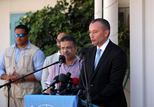
UN Special Coordinator for the settlement process in the Middle East Nikola Mladenov on Thursday declared that a UN meeting is to be held in the near future to discuss Gaza power and water crisis and reconstruction process.
In a press conference held shortly after reaching Gaza Strip, Mladenov said that a meeting is scheduled to be held on the sidelines of the UN General Assembly session by the end of this month.
The meeting is expected to bring further progress in settling Gaza crisis, he said.
Early Thursday, Mladenov arrived to the blockaded enclave through the Israeli-controlled Erez crossing. It is the second visit paid by Mladenov to Gaza since he was appointed as the UN Special Coordinator for the settlement process in the Middle East last March.
His few-hour visit aims at discussing Gaza reconstruction process and finding solutions for the economic crisis faced by 1.8 million people in the besieged Strip.
"It is very important to achieve a better life for the people of Gaza," Miladenov said.
“The people’s anger grows over the massive economic deterioration and the continued power outages here. Thus, this anger would certainly lead to extremism. So, we must double our efforts for Gaza reconstruction.”
Meanwhile, he gave a rare upbeat assessment in the Gaza Strip, saying that reconstruction from last year's war on Gaza is speeding up.
The reconstruction of hundreds of houses started last month with the help of Qatar, which has donated millions of dollars to rebuild 1,000 housing units, he pointed out.
"I'm very happy to be able to report today that the reconstruction effort has visibly accelerated within the last two months," said Mladenov.
However, he noted that Gaza reconstruction process is facing a major shortfall in humanitarian funding.
"We are very far from reaching the goal of restoring normal life to Gaza," Miladenov said.
"We will work with both the Israeli and Palestinian parties to solve Gaza crisis," he vowed.
In this regard, he called on the Palestinian Authority to take full control and responsibility in Gaza in order to achieve its faster reconstruction.
More than 2,200 Palestinians, including 500 children, were killed during the Israeli 51-day aggression on Gaza last summer, while thousands of homes, schools, and hospitals were destroyed.
In a press conference held shortly after reaching Gaza Strip, Mladenov said that a meeting is scheduled to be held on the sidelines of the UN General Assembly session by the end of this month.
The meeting is expected to bring further progress in settling Gaza crisis, he said.
Early Thursday, Mladenov arrived to the blockaded enclave through the Israeli-controlled Erez crossing. It is the second visit paid by Mladenov to Gaza since he was appointed as the UN Special Coordinator for the settlement process in the Middle East last March.
His few-hour visit aims at discussing Gaza reconstruction process and finding solutions for the economic crisis faced by 1.8 million people in the besieged Strip.
"It is very important to achieve a better life for the people of Gaza," Miladenov said.
“The people’s anger grows over the massive economic deterioration and the continued power outages here. Thus, this anger would certainly lead to extremism. So, we must double our efforts for Gaza reconstruction.”
Meanwhile, he gave a rare upbeat assessment in the Gaza Strip, saying that reconstruction from last year's war on Gaza is speeding up.
The reconstruction of hundreds of houses started last month with the help of Qatar, which has donated millions of dollars to rebuild 1,000 housing units, he pointed out.
"I'm very happy to be able to report today that the reconstruction effort has visibly accelerated within the last two months," said Mladenov.
However, he noted that Gaza reconstruction process is facing a major shortfall in humanitarian funding.
"We are very far from reaching the goal of restoring normal life to Gaza," Miladenov said.
"We will work with both the Israeli and Palestinian parties to solve Gaza crisis," he vowed.
In this regard, he called on the Palestinian Authority to take full control and responsibility in Gaza in order to achieve its faster reconstruction.
More than 2,200 Palestinians, including 500 children, were killed during the Israeli 51-day aggression on Gaza last summer, while thousands of homes, schools, and hospitals were destroyed.
14 sept 2015
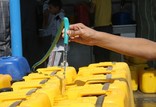
From time to time it can be difficult to overlook the water crisis in the Palestinian territories, especially the Gaza Strip.
Nearly two million Gazans suffer from environmental and humanitarian crises that are exacerbated by the water crisis.
Occupation control
The first and main reason for the water crisis in Palestine is the Israeli occupation’s control over water resources whether in Gaza or in the West Bank; the second reason is the Palestinian mismanagement and poor distribution of the available water resources.
These findings were reported by the PIC correspondent during the panel discussion organized by the Palestinian NGOs Network in Gaza entitled: "Water crisis in Palestine".
Dr. Abdulrahman Tamimi, director of the hydrologists group, confirmed during the discussion that Gaza Strip is experiencing an environmental and humanitarian crisis and catastrophe which entails finding quick solutions and strategies to manage the water and sanitations sectors.
Dr. Tamimi pointed out that it is possible to overcome the water crisis by transferring water from one region to the other. He said that water can be transferred from Tulkarem and Qalqilya governorates to Jenin governorate for example.
And he pointed to a problem he described as "big" which is citizens' ownership of water wells dug randomly recently or long time ago.
"Therefore, working on solving this problem will make it possible to transfer water which is privately owned to become public and distributed to the regions in need," he said, stressing that water is a right for everyone.
Water theft
He underlined that the Israeli occupation authority had worked on constructing 12 desalination plants to solve its water shortages among which 4 are completed, while there is no Palestinian plan regarding the crisis.
He said that Gaza Strip relies on groundwater as the only source of water supply for all uses.
He also said that the Palestinian decision-maker pursues partial solutions instead of adopting comprehensive ones.
He resolved that: "If this situation remains unchanged the Palestinians will unfortunately be in the near future customers of the water, gas, and power companies” of Israel".
The crisis in Palestine
The director of the NGO Network, Amjad Shawwa, stressed the importance of holding this panel discussion at this time to “review the components, reasons and suggested solutions for the water crisis in Palestine".
And he pointed out that 95% of the Gaza Strip water is unfit for human use. Also: PDF
Nearly two million Gazans suffer from environmental and humanitarian crises that are exacerbated by the water crisis.
Occupation control
The first and main reason for the water crisis in Palestine is the Israeli occupation’s control over water resources whether in Gaza or in the West Bank; the second reason is the Palestinian mismanagement and poor distribution of the available water resources.
These findings were reported by the PIC correspondent during the panel discussion organized by the Palestinian NGOs Network in Gaza entitled: "Water crisis in Palestine".
Dr. Abdulrahman Tamimi, director of the hydrologists group, confirmed during the discussion that Gaza Strip is experiencing an environmental and humanitarian crisis and catastrophe which entails finding quick solutions and strategies to manage the water and sanitations sectors.
Dr. Tamimi pointed out that it is possible to overcome the water crisis by transferring water from one region to the other. He said that water can be transferred from Tulkarem and Qalqilya governorates to Jenin governorate for example.
And he pointed to a problem he described as "big" which is citizens' ownership of water wells dug randomly recently or long time ago.
"Therefore, working on solving this problem will make it possible to transfer water which is privately owned to become public and distributed to the regions in need," he said, stressing that water is a right for everyone.
Water theft
He underlined that the Israeli occupation authority had worked on constructing 12 desalination plants to solve its water shortages among which 4 are completed, while there is no Palestinian plan regarding the crisis.
He said that Gaza Strip relies on groundwater as the only source of water supply for all uses.
He also said that the Palestinian decision-maker pursues partial solutions instead of adopting comprehensive ones.
He resolved that: "If this situation remains unchanged the Palestinians will unfortunately be in the near future customers of the water, gas, and power companies” of Israel".
The crisis in Palestine
The director of the NGO Network, Amjad Shawwa, stressed the importance of holding this panel discussion at this time to “review the components, reasons and suggested solutions for the water crisis in Palestine".
And he pointed out that 95% of the Gaza Strip water is unfit for human use. Also: PDF
10 sept 2015
holes and the pumping stations were [heavily hit.] More than 50 percent of the water infrastructure could not be accessed. Some of the infrastructure was completely destroyed.”
And since the 2014 onslaught, Israel has prevented the import of materials that could repair the damage – thus further exacerbating the already dire humanitarian crisis.
Prior to Israel’s invasion of Gaza in July 2014, the Israeli Information Center for Human Rights in the Occupied Palestinian Territories B’Tselem issued a report that 90% of the water in Gaza was unfit for drinking.
Ibtesam Kheir a-Din, 48, a married mother of six lives in a-Sultan neighborhood, Rafah, related to B'Tselem, “The water we get is salty and unfit for drinking. Sometimes it even smells bad. We use it only to clean the house and do dishes and laundry, but nothing ever feels really clean. The clothes sometimes smell bad and get stained. The water also ruins the washing machine.
We've fixed the machine several times, which cost us 50 to 70 shekels [approx. 14 USD – 20USD] every time, and the technician said the problems were caused by the too many salts in the water. We don't drink the water or use it for cooking. For cooking and drinking, we buy water every day from vendors who go around the neighborhood or from shops that sell water containers. We buy 50 liters of fresh water a day, at two shekels [approx. 0.6 USD] a liter.
Lately, because power outages have gone on for as long as twelve hours at time and because we don't have enough money to pay for fuel to run the generator to fill the containers, we've started buying water for dishwashing and laundry, too.”
According to RT, the Gaza Strip’s GDP dropped 15 percent in 2014, with 72 percent of households suffering extremely low food security and unemployment at a record high of 44 percent. Further stress was added by relentless Israeli assaults. With three military operations in the last six years, coupled with eight years of economic blockade, prospects for recovery are looking very bleak.
The UN says that 500,000 people have been displaced in Gaza as a result of last year's IDF operation alone. More than 20,000 Palestinian homes were destroyed, and 148 schools and 15 hospitals and 45 primary health-care centers were severely damaged. Gaza is one of the most densely populated areas in the world.
But the condition of the water is the worst part of the infrastructure destruction, as it leaves the population of Gaza largely without potable water.
According to the RT Report, unless the situation is resolved, the Strip stands on the brink of a full-scale humanitarian catastrophe much greater than any airstrikes can cause.
And since the 2014 onslaught, Israel has prevented the import of materials that could repair the damage – thus further exacerbating the already dire humanitarian crisis.
Prior to Israel’s invasion of Gaza in July 2014, the Israeli Information Center for Human Rights in the Occupied Palestinian Territories B’Tselem issued a report that 90% of the water in Gaza was unfit for drinking.
Ibtesam Kheir a-Din, 48, a married mother of six lives in a-Sultan neighborhood, Rafah, related to B'Tselem, “The water we get is salty and unfit for drinking. Sometimes it even smells bad. We use it only to clean the house and do dishes and laundry, but nothing ever feels really clean. The clothes sometimes smell bad and get stained. The water also ruins the washing machine.
We've fixed the machine several times, which cost us 50 to 70 shekels [approx. 14 USD – 20USD] every time, and the technician said the problems were caused by the too many salts in the water. We don't drink the water or use it for cooking. For cooking and drinking, we buy water every day from vendors who go around the neighborhood or from shops that sell water containers. We buy 50 liters of fresh water a day, at two shekels [approx. 0.6 USD] a liter.
Lately, because power outages have gone on for as long as twelve hours at time and because we don't have enough money to pay for fuel to run the generator to fill the containers, we've started buying water for dishwashing and laundry, too.”
According to RT, the Gaza Strip’s GDP dropped 15 percent in 2014, with 72 percent of households suffering extremely low food security and unemployment at a record high of 44 percent. Further stress was added by relentless Israeli assaults. With three military operations in the last six years, coupled with eight years of economic blockade, prospects for recovery are looking very bleak.
The UN says that 500,000 people have been displaced in Gaza as a result of last year's IDF operation alone. More than 20,000 Palestinian homes were destroyed, and 148 schools and 15 hospitals and 45 primary health-care centers were severely damaged. Gaza is one of the most densely populated areas in the world.
But the condition of the water is the worst part of the infrastructure destruction, as it leaves the population of Gaza largely without potable water.
According to the RT Report, unless the situation is resolved, the Strip stands on the brink of a full-scale humanitarian catastrophe much greater than any airstrikes can cause.
7 sept 2015

The Israeli occupation forces on early Monday morning rolled into al-Khalil’s southern town of Yatta and notified the demolition of water wells and two residential tents.
A PIC journalist quoted the coordinator for the local anti-settlement committee, Rateb al-Jabour, as stating that Israeli soldiers, escorted by civil administration crews, raked through Yatta’s residential communities and threatened to knock down three water wells and two civilian tents.
The targeted water wells reportedly belong to the Dababseh family and the residential tents are owned by the Hamamdas.
Some 11 residential villages and communities in Yatta are threatened with demolition, al-Jabour added, raising concerns over increasing arbitrary demolitions of Palestinian civilian structures as part of a larger Israeli scheme of ethnic-cleansing.
A PIC journalist quoted the coordinator for the local anti-settlement committee, Rateb al-Jabour, as stating that Israeli soldiers, escorted by civil administration crews, raked through Yatta’s residential communities and threatened to knock down three water wells and two civilian tents.
The targeted water wells reportedly belong to the Dababseh family and the residential tents are owned by the Hamamdas.
Some 11 residential villages and communities in Yatta are threatened with demolition, al-Jabour added, raising concerns over increasing arbitrary demolitions of Palestinian civilian structures as part of a larger Israeli scheme of ethnic-cleansing.
6 sept 2015

The Egyptian authorities are implanting a waterway project along Egypt’s borders with Gaza to “stop the smuggling tunnels”, a project that is seen by a number of the relevant government departments in Gaza to be a threat to water security.
The deputy head of the Water Authority in Gaza, Mazen al-Banna, addressed a press conference on Sunday also representing the Ministry of Agriculture, Water Authority, Authority of the Environment, and Ministry of Local Government. He stated, “The project is considered a violation of the rights of the two peoples (Egyptian and Palestinian).”
He demanded an instant halt of the project for the threats it imposes on many levels, including the water, economic, and national security of both Egypt and Palestine.
Al-Banna clarified that the implementation of this project disregards the environmental crises it would bring to Palestine, let alone Egypt. The threats include destroying the mutual groundwater reservoir in the region through the leakage of the salt water into the groundwater.
He stressed that the Egyptian project is an application of what the Israeli occupation tried to implement a decade ago. He recalled that the Israeli government back then planned to dig a waterway along the Egyptian-Palestinian borders to foil the Palestinian resistance’s efforts to smuggle weapons. Al-Banna noted that the Egyptian authorities have destroyed the vast majority of the tunnels.
The deputy head of the Water Authority called on the Egyptian people and government to take all measures to stop this project immediately.
He asked for an immediate UN intervention to put pressure on the Egyptian government to stop the catastrophic project that would endanger all environmental elements in the area.
Al-Banna urged the Arab League and the Organization of the Islamic Conference to exert influence on Egypt to halt the project that would threaten the Arab and Islamic national security.
He also urged the international eco-friendly and human rights organizations to interfere.
The Egyptian military bulldozers have commenced digging huge fishponds, that are to be filled with seawater, along the Gaza-Egypt borders.
The deputy head of the Water Authority in Gaza, Mazen al-Banna, addressed a press conference on Sunday also representing the Ministry of Agriculture, Water Authority, Authority of the Environment, and Ministry of Local Government. He stated, “The project is considered a violation of the rights of the two peoples (Egyptian and Palestinian).”
He demanded an instant halt of the project for the threats it imposes on many levels, including the water, economic, and national security of both Egypt and Palestine.
Al-Banna clarified that the implementation of this project disregards the environmental crises it would bring to Palestine, let alone Egypt. The threats include destroying the mutual groundwater reservoir in the region through the leakage of the salt water into the groundwater.
He stressed that the Egyptian project is an application of what the Israeli occupation tried to implement a decade ago. He recalled that the Israeli government back then planned to dig a waterway along the Egyptian-Palestinian borders to foil the Palestinian resistance’s efforts to smuggle weapons. Al-Banna noted that the Egyptian authorities have destroyed the vast majority of the tunnels.
The deputy head of the Water Authority called on the Egyptian people and government to take all measures to stop this project immediately.
He asked for an immediate UN intervention to put pressure on the Egyptian government to stop the catastrophic project that would endanger all environmental elements in the area.
Al-Banna urged the Arab League and the Organization of the Islamic Conference to exert influence on Egypt to halt the project that would threaten the Arab and Islamic national security.
He also urged the international eco-friendly and human rights organizations to interfere.
The Egyptian military bulldozers have commenced digging huge fishponds, that are to be filled with seawater, along the Gaza-Egypt borders.
30 aug 2015
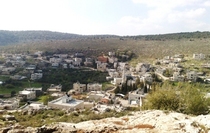
Ongoing Israeli drilling works, including detonation of rocks, near the village of Wadi Fukin, to the west of Bethlehem, may put the lives of nearby Palestinians at risk, according to village mayor Ahmad Sukkar.
Sukkar said, recently, that renewed drilling work by the Israeli authorities in the area also involve the use of heavy explosives to detonate rocks. This, according to him, has put the lives of many Palestinians as well as their properties and homes at risk, as a great amount of stone shrapnel splattered and fell near homes during detonation of rocks.
According to WAFA, the mayor also said that detonations work have badly affected water resources in and outside the village, and the outcomes are much worse given the nature of the village and the fact it relies heavily on agriculture.
The village is just close to Beitar Illit illegal settlement, one of the largest and most rapidly growing Israeli settlements in the West Bank. The settlement was established in 1984 on the lands of the Palestinian village of Husan.
Settlement activities in the Occupied Palestinian Territories and the Golan Heights, both occupied since 1967, are considered illegal under international law.
The settler population in the West Bank is estimated at 531,000: in the late 2012 the population of the West Bank settlements reached 341,400 while in the late 2011 there were 190,423 individuals living in Israeli neighborhoods in East Jerusalem.
B’Tselem the Israeli human rights group said, “The settlements have been allocated vast areas, far exceeding their built-up sections. These areas have been declared closed military zones by military orders and are off limits to Palestinians, except by special permit. In contrast, Israeli citizens, Jews from anywhere in the world and tourists may all freely enter these areas.”
Sukkar said, recently, that renewed drilling work by the Israeli authorities in the area also involve the use of heavy explosives to detonate rocks. This, according to him, has put the lives of many Palestinians as well as their properties and homes at risk, as a great amount of stone shrapnel splattered and fell near homes during detonation of rocks.
According to WAFA, the mayor also said that detonations work have badly affected water resources in and outside the village, and the outcomes are much worse given the nature of the village and the fact it relies heavily on agriculture.
The village is just close to Beitar Illit illegal settlement, one of the largest and most rapidly growing Israeli settlements in the West Bank. The settlement was established in 1984 on the lands of the Palestinian village of Husan.
Settlement activities in the Occupied Palestinian Territories and the Golan Heights, both occupied since 1967, are considered illegal under international law.
The settler population in the West Bank is estimated at 531,000: in the late 2012 the population of the West Bank settlements reached 341,400 while in the late 2011 there were 190,423 individuals living in Israeli neighborhoods in East Jerusalem.
B’Tselem the Israeli human rights group said, “The settlements have been allocated vast areas, far exceeding their built-up sections. These areas have been declared closed military zones by military orders and are off limits to Palestinians, except by special permit. In contrast, Israeli citizens, Jews from anywhere in the world and tourists may all freely enter these areas.”
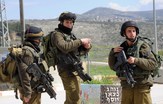
Groups of Jewish settlers stormed on Saturday al-Karmel town in al-Khalil in the southern West Bank.
Eyewitnesses told the PIC reporter that groups of settlers broke into al-Karmel town to the east of al-Khalil under protection of Israeli occupation forces (IOF). The settlers attempted to perform Talmudic rituals at a water pool in the town while Israeli military vehicles were deployed in location.
Repeated settlers’ incursions into the town particularly in the vicinity of the town’s water pool and park have been conducted for confiscation purposes under the claim of being Jewish holy sites.
In a similar context, the IOF erected on Saturday morning a military checkpoint at the entrance of al-Aroub refugee camp in northern al-Khalil.
Eyewitnesses told the PIC reporter that groups of settlers broke into al-Karmel town to the east of al-Khalil under protection of Israeli occupation forces (IOF). The settlers attempted to perform Talmudic rituals at a water pool in the town while Israeli military vehicles were deployed in location.
Repeated settlers’ incursions into the town particularly in the vicinity of the town’s water pool and park have been conducted for confiscation purposes under the claim of being Jewish holy sites.
In a similar context, the IOF erected on Saturday morning a military checkpoint at the entrance of al-Aroub refugee camp in northern al-Khalil.
27 aug 2015
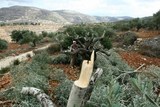
The Israeli occupation army has issued orders to evacuate and destroy the Ainoun nature reserve near Tubas city, north of the West Bank, at the pretext it is located in a closed military zone.
Local sources reported that Israeli troops and employees from the Israeli army's civil administration notified the Palestinian officials in charge of the reserve of military orders to evacuate the reserve and bulldoze it.
The Palestinians would also not be allowed to enter the territory after its evacuation, according to a notice delivered to the reserve's management.
Head of the Wadi Maleh local council Aref Daraghmeh told Quds Press that the Israeli army had destroyed vast tracts of the reserve several times before and uprooted thousands of its forest trees.
Daraghmeh added that the Israeli army also damaged and confiscated on several occasions equipment used to supply the reserve with water.
Such reserves are supervised by the directorate of agriculture in Tubas, which also works on cultivating and improving them as part of a plan carried out by the Palestinian ministry of agriculture to green Palestine.
Local sources reported that Israeli troops and employees from the Israeli army's civil administration notified the Palestinian officials in charge of the reserve of military orders to evacuate the reserve and bulldoze it.
The Palestinians would also not be allowed to enter the territory after its evacuation, according to a notice delivered to the reserve's management.
Head of the Wadi Maleh local council Aref Daraghmeh told Quds Press that the Israeli army had destroyed vast tracts of the reserve several times before and uprooted thousands of its forest trees.
Daraghmeh added that the Israeli army also damaged and confiscated on several occasions equipment used to supply the reserve with water.
Such reserves are supervised by the directorate of agriculture in Tubas, which also works on cultivating and improving them as part of a plan carried out by the Palestinian ministry of agriculture to green Palestine.
17 aug 2015
This bulldozer destroyed the only water pipe in the village, leaving the people Kafr Qaddum without any connection to water until the pipe is repaired.
Especially during the hot summer months, water is a scarce and essential good.
Murad Shtaiwi, one of the leaders of Kafr Qaddum Popular Committee, understands the damage to the water pipe as a way to collectively punish the village for its ongoing resistance. The costs of a new pipe have to be paid for by the municipality. As Murad explains, damaging the water pipe is a deliberate attempt by the Israeli army to suppress the support amongst the villagers to continue to protests and thus block future demonstrations.
Especially during the hot summer months, water is a scarce and essential good.
Murad Shtaiwi, one of the leaders of Kafr Qaddum Popular Committee, understands the damage to the water pipe as a way to collectively punish the village for its ongoing resistance. The costs of a new pipe have to be paid for by the municipality. As Murad explains, damaging the water pipe is a deliberate attempt by the Israeli army to suppress the support amongst the villagers to continue to protests and thus block future demonstrations.

